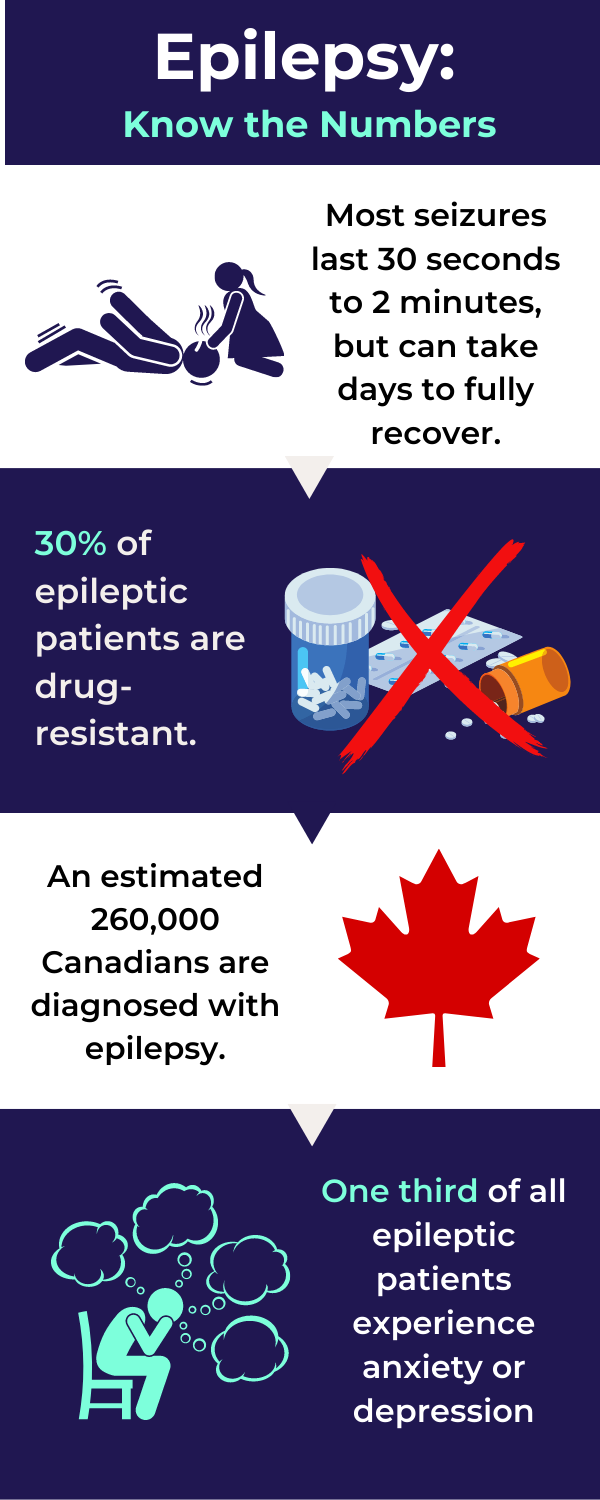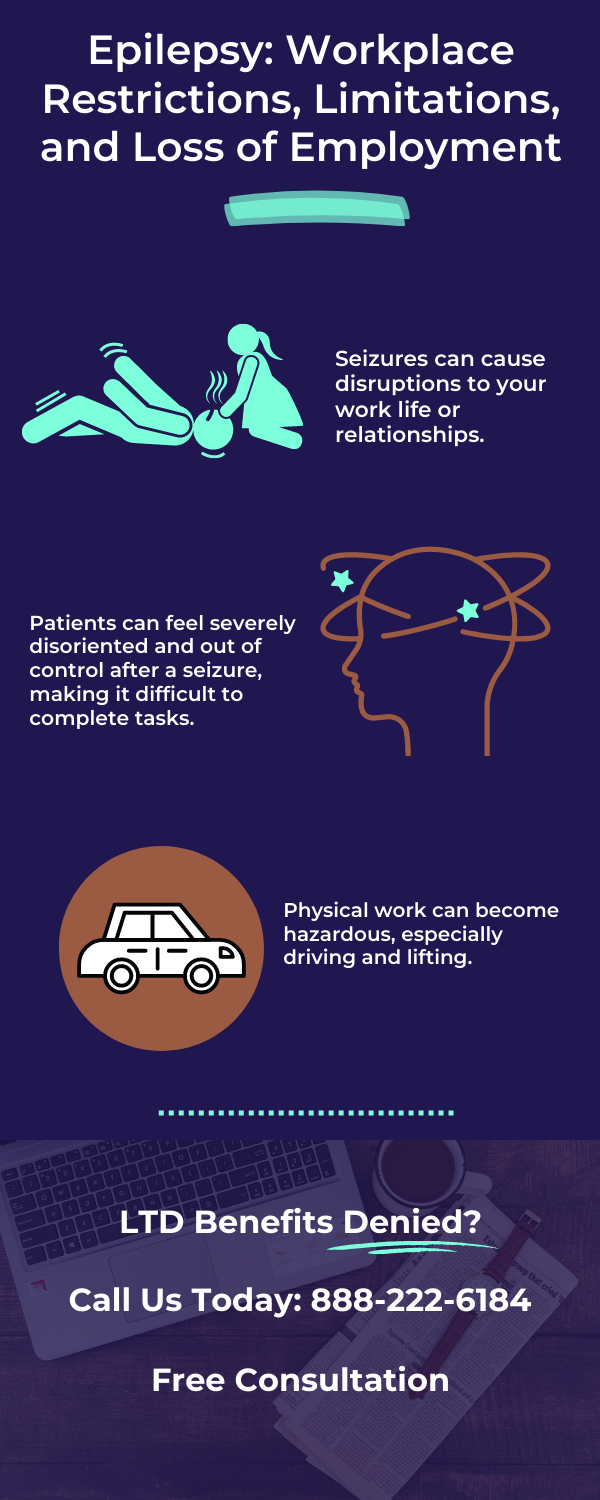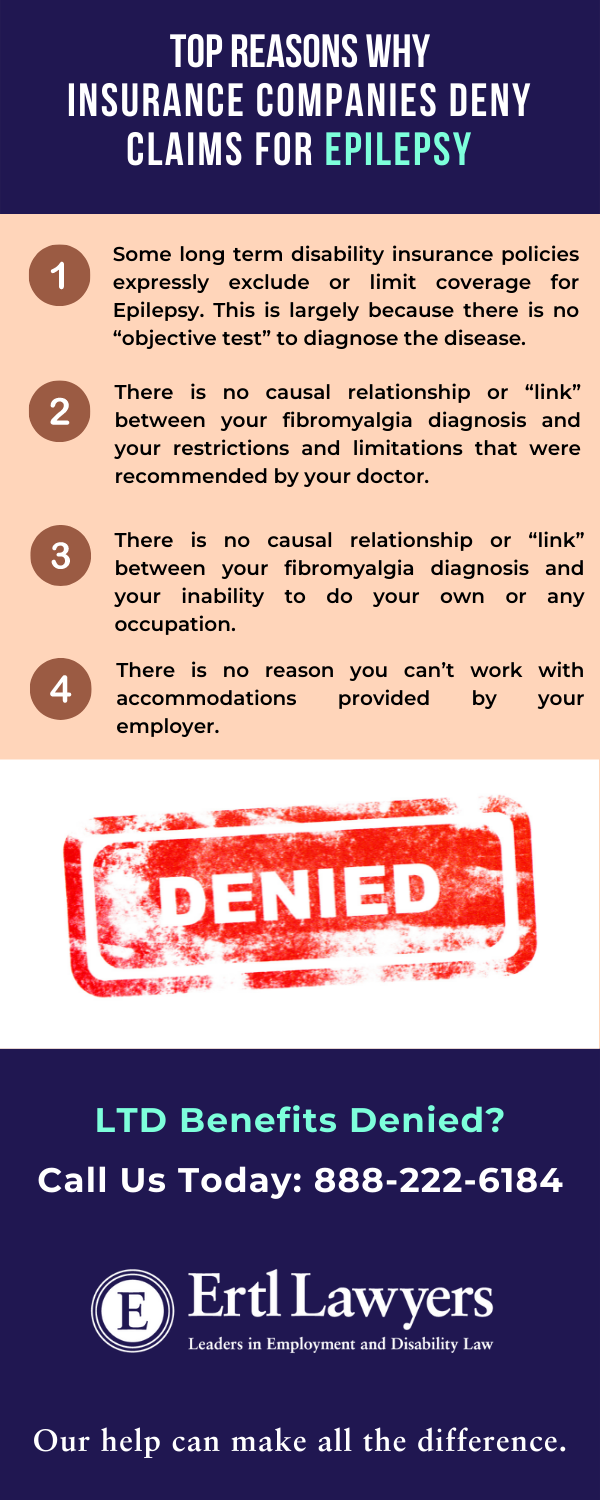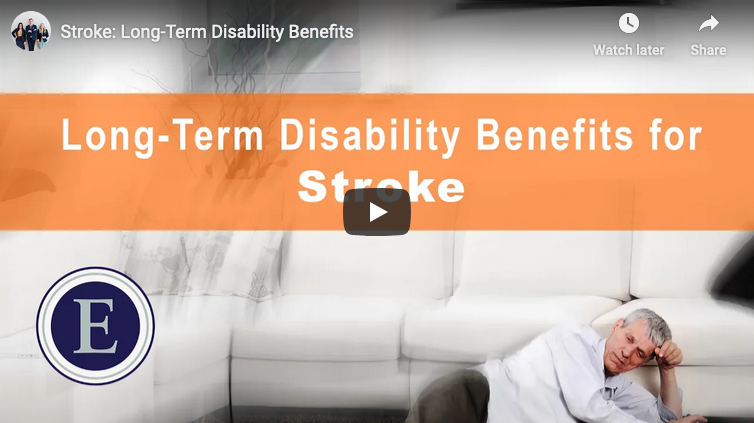Do I Qualify for Long-Term Disability Benefits if I Have Epilepsy?
Can I Get Long-Term Disability Benefits for Epilepsy?
One of the most common questions we get is “Do I qualify for long-term disability benefits if I have Epilepsy?”
Epilepsy is a disease of the central nervous system that causes abnormal brain activity, otherwise known as seizures. Seizures and other epileptic symptoms can have a significant impact on a person’s employment and daily life.
Therefore, Epilepsy can qualify for long-term disability benefits – provided it is not excluded by your insurance policy wording.
LTD Denied? Which Category Do You Fit In?
Category 1: The insurance company denied your initial claim for disability benefits for Epilepsy.
Category 2: The insurance company denied your appeal.
Category 3: The insurance company discontinued or terminated your benefits.
What Can We Do For You?
We’ll work with you and your physician to help challenge the insurance company’s denial or discontinuance of your long-term disability benefits.
Where necessary, we will engage other trusted professionals to support your case including specialists, functional capacity evaluators, and vocational evaluators to help credibly explain why your disability symptoms are preventing you from doing your “own occupation” or “any occupation”.
Our Help Can Make All The Difference. How?
- Over 25 years’ combined experience getting our clients the benefits they deserve.
- Expertise in both disability and employment law (your employment status is directly linked with your disability)
- We offer a free case assessment
- We offer flexible rates, including contingency fees (i.e., only pay if you win)
- Service across all of Ontario


Epilepsy: Overview
Epilepsy is a neurologic condition that causes repeated seizures, which are a sudden, temporary change in the electrical functioning of the brain.
These changes affect the consciousness, movements, and sensations of a patient.
Usually, tiny electrical pulses are generated by the brain in an orderly pattern. They travel throughout the brain and deliver messages via neurotransmitters.
In an epileptic brain, the normal pattern is disrupted by burst of electrical energy that alter the brain’s function. [1]
In half of epileptic cases, epilepsy has no apparent cause. The other half can be linked to the following factors:
- Genetics
- Head trauma
- Brain abnormalities
- Infections
- Prenatal injury
- Developmental disorders [2]
Intensity of the symptoms is extremely variable from person to person. The type of epilepsy a person is diagnosed with may also determine the severity of a seizure.
There are two main types of seizures; focal onset and generalized onset. Focal onset seizures are more common and only occur in one part of the brain. Generalized onset seizures affect both sides of the brain.

Most Common Symptoms of Epilepsy
Seizure symptoms are mainly associated with:
Jerking movements: the rapid muscles spasms are continuous and last between 1-3 minutes. A person can’t stop these movements, even if jerks are mild.
Loss of consciousness or awareness: In some cases, a person will lose consciousness and won’t be aware of jerking during the seizure. In mild, focal onset seizures, a patient may only lose awareness of their surroundings.
Confusion: Throughout the process of having a seizure, the patient can become confused and unaware of what happened.
Other symptoms can include:
- Staring spells
- Stiff muscles
- Fatigue
- Fear
- Anxiety
- Deja vu [2]
Important: Many people with Epilepsy become discouraged, which can lead to depression and anxiety.
Criteria for a Diagnosis of Parkinson’s Disease
There is no single test to confirm if you have Epilepsy. Doctors have to rule out other conditions to make a diagnosis, and determine the type of seizures a patient is experiencing, but there are now Ontario guidelines to identify Epilepsy.
The main diagnostic criteria using the Ontario guidelines are:
- At least two unprovoked (or reflex) seizures occurring >24h apart.
- One unprovoked (or reflex) seizure and a probability of further seizures similar to the general recurence risk (at least 60%) after two unprovoked seizures, occuring over the next 10 years.[3]
Treatment for Parkinson’s Disease
There is no cure for Epilepsy, however patients can stop or reduce seizures with both medication-based and therapy-based treatments.
Medication
Antiepileptic drugs (AEDs) are the most common medications used for seizures. By changing the chemical imbalances in the brain, they can reduce or eventually stop seizures.
For some people, medication can be discontinued, while others may struggle finding the right dosage and/or medication for their symptoms. Some epileptic patients are drug resistant and don’t respond to medication.
Therapy
As each case of Epilepsy is difference from another, therapies such as the following may or may not help or reduce stress in any particular person with Epilepsy:
- cognitive behavioural therapy
- psychotherapy
- massage therapy
- acupuncture
- biofeedback
- chiropractic
- homeopathy
- hypnotherapy
- mental imaging
- naturopathy
- osteopathy

Epilepsy & Your Employment

Workplace Restrictions Caused by Epilepsy
When considering your employment and Epilepsy diagnosis, consider how stable your condition is, how safe you are to do your job and what the demands are physically and mentally.
Many individuals suffering from Epilepsy may experience seizures, confusion, or a loss of consciousness or awareness.
Epilepsy and Workplace Discrimination
It is unlawful to discriminate against someone in the area of employment based on their physical disability: Ontario’s Human Rights Code and the Canadian Human Rights Act.
If you are suffering from Epilepsy, you might face discrimination in a variety of ways:
- You experience employment termination because you have Epilepsy.
- You are denied accommodation because of your Epilepsy.
- After returning from a disability leave, your employer places you in a lower, part-time position at a lower rate of pay.
- Someone makes unwelcome remarks or jokes about your disability.
- Someone offends or humiliates you physically or verbally threatens or intimidates you because of your disability.
- Retaliating against you for filing a human rights complaint.
Ertl Lawyers are experts in Employment and Disability Law. If you have been discriminated against, our disability and employment lawyers in Toronto can help, including:
- Having your employer comply with their duty to accommodate you.
- Having your employer stop all forms of discriminatory conduct.
- Representing you in wrongful dismissal in Ontario, constructive dismissal, and human rights matters.
- Ensuring that your employer complies with its statutory obligations, including its obligations under the Employment Standards Act.
- Negotiation severance packages (including continuation of benefits).

Epilepsy & Insurance Companies

Apply for Long-Term Disability Benefits for Epilepsy?
Review Your Policy Carefully
Your entitlement to disability benefits for Epilepsy depends on the specific wording of your disability policy.
As noted, some policies outright exclude Epilepsy coverage or else consider it a “mental disorder” (and seek to limit the amount of benefits).
It is important that you understand how the insurance company defines things like “totally disabled,” “occupation,” “mental disorder, “self-reported condition” – and whether any exclusions apply (particularly for pre-existing conditions).
Bottom line: You need to know what your policy says before you apply for benefits.
Gather Medical Evidence
To be entitled to disability benefits for Epilepsy, every insurer requires you to provide medical evidence documenting your diagnosis and that your illness or injury causes restrictions or lack of ability, such that you are prevented from performing the essential duties of your occupation.
It is recommended that you get treated by a medical professional who will diagnose your condition using established criteria.
It is also recommended that you provide to the insurer results of any Functional Capacity Evaluation or cognitive testing that objectively documents your physical and (if applicable) mental limitations.
Gather Evidence of Workplace Limitations
Because your entitlement to long-term disability benefits for Epilepsy depends on the strength of your evidence, you should get a copy of your employee file from work. It may show that your Epilepsy has negatively impacted your work performance. Your work performance may have been affected by your pain, fatigue, cognitive impairment, or other symptoms.
Create a List of the Physical Duties of Your Job
You should get a copy of your job description. Based on that job description, you should write out a detailed list of the physical (and mental) duties associated with your job description – and explain how your Epilepsy limits or prevents you from performing you own occupation.
Follow Your Doctor’s Treatment Plan
Your entitlement to long-term disability benefits also requires you to be receiving regular, ongoing care and treatment for your Epilepsy. In other words, don’t skip appointments, and always follow your doctor’s treatment plans.
Keep a Pain Diary
On your end, it is important to keep a pain diary. A pain diary is a written record that helps you keep track of when you have pain, how bad it is, and whether your treatment is helping.
What Other Benefits Might I Be Entitled to for Epilepsy?
Other than short-term and long-term disability benefits through a group or individual insurance plan, people suffering from Epilepsy might be entitled to one or more of the following benefits:
- Employment Insurance (EI) Sickness Benefits;
- Ontario Disability Support Plan (ODSP);
- Disability Tax Credit (DTC);
- Disability Creditor Insurance (under your mortgage or credit cards);
- Trillium (extended health benefits);
- Canada Pension Plan Disability (CPP-D); and
- Disability Pension (employer).
Organizations / Associations / Colleges
Disclaimer: The content on this web site is provided for general information purposes only and does not constitute legal, medical, or other professional advice or an opinion of any kind. Users of this web site are advised to seek specific legal advice by contacting members of Ertl Lawyers (or their own legal counsel) regarding any specific legal issues. Ertl Lawyers does not warrant or guarantee the quality, accuracy or completeness of any information on this web site
Sources:
[2]https://www.mayoclinic.org/diseases-conditions/epilepsy/symptoms-causes/syc-20350093
[3]https://clinictocommunity.ca/wp-content/uploads/2021/01/ManagementGuidelines_Nov2020.pdf
Long-Term Disability Benefits Denied?
Ertl Lawyers provides expert representation in long-term disability matters.
The vast majority of disability matters are resolved through negotiation and mediation – and that’s because insurance companies know that we are passionate about our clients’ rights.
How we can help you:
• free disability policy analysis
• free case assessment
• applying for disability benefits
• appealing a denial or termination of your benefits
• disputing a denial through a legal claim
• handling all communications with your employer
• protecting your employment
• prosecuting human rights claims
Fair, Flexible Rates – Including Contingency Fees
(Don’t Pay Unless You Win)
Our Help Can Make All The Difference.
Related Blogs
Examples of Disability Discrimination
Despite the best intentions of the federal government and provincial legislators, disability discrimination is still causing too many Canadians to be excluded from the basic necessities of life.If you are facing unfair and discriminatory challenges at work, speak with...
Understanding the Duty to Accommodate Laws in Canada
A duty to accommodate is an attempt to even the playing field in circumstances that inherently discriminate against a person based on grounds they have no control over and that are protected in several Canadian statutes. Protected (or prohibited) grounds typically...
What Qualifies for Long-Term Disability in Canada?
Long-term disability (LTD) benefits are paid out by insurance companies according to the policy purchased by a worker, their union/association or their employer, and each has specific rules regarding how you qualify for long-term disability benefits. The general rule...






